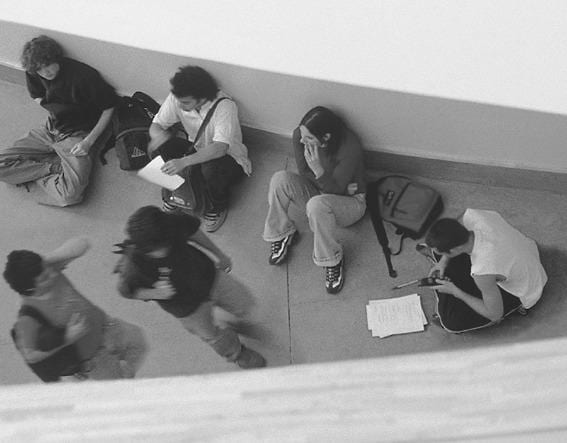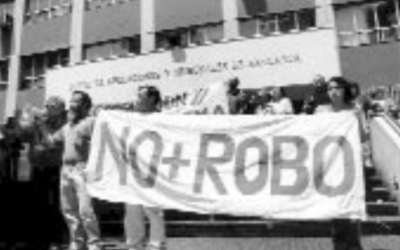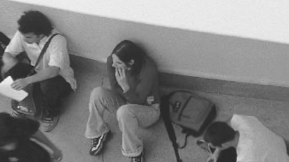Salamanca of the Southern Cone
Harvard Study Abroad in Chile

University students at their studies. Photo by Alejandro Barruel.
A few decades ago, Chile was commonly perceived as a long, earthquake-prone country in South America with a tough human rights record that made even intrepid travelers wary. Today, the return to democratic rule, increasing prosperity, active social and cultural life, and excellent universities have all helped convert Santiago into a Spanish-speaking destination of choice for foreign students, a sort of the Salamanca of the southern cone. While the strange lingo spoken by young Chileans may make some students nervous, soon the chilenismos become like passwords into a unique linguistic club (¿cachai?).
In February 2003, the DRCLAS Regional Office in Santiago and the Harvard’s Office of International Programs established a semester-length study abroad program for Harvard College students. One year later, as participants return to Harvard and word of mouth spreads, the program’s enrollment has doubled. The Harvard study abroad program in Chile is the first-ever Harvard University-administered study abroad program anywhere in the world.
Program participants are able to matriculate at one of three excellent universities: the Pontificia Universidad Católica, the Universidad de Chile, and the Universidad Adolfo Ibáñez. The selected students—meeting requirements of intermediate Spanish and an adventurous spirit—arrive in Santiago before university classes begin to take part in a two-week orientation program in which they are introduced to the history of Chilean culture and the quirks of Chilean Spanish. Harvard students live with Chilean host families to enhance their experience and their Spanish. Throughout the semester, students are encouraged to travel both within Chile and beyond. The DRCLAS Regional Office often facilitates many program options—including internships at local, national, and international organizations.
During the orientation program and throughout the semester, students visit famous and less famous sites, including Isla Negra, poet Pablo Neruda’s coastal home-turned- museum, and La Victoria, the first squatters’ settlement in Santiago and South America, dating back to the mid-1950s. In the same week that the students are welcomed to the Santiago office of CEPALECLAC, the United Nations’ Economic Commission for Latin American and the Caribbean, they have the chance to visit orphanages such as the Hogar Domingo Savio, providing social services to underprivileged children. This diverse combination of experiences allows the students to have a broad perspective of Chile politically, economically and socially providing them with the tools necessary to form their own analyses.
DRCLAS is able to provide a cushion of logistical support for students so that they are able to take full advantage of their experiences and the new environment around them without the hesitation that comes with stepping where one hasn’t stepped before, while feeling confident that Harvard University is behind them in this endeavor. Recent participant and History concentrator Carlos Rojas (Harvard College ’04) observed: “The program made each step of getting to Chile and into the university easy. Receiving credit was also very easy. I believe that DRCLAS and its many links with individuals and organizations in Latin American made any interest a possibility. Normally the difficulty in studying abroad is the effort necessary to bring together different institutions for your own needs; DRCLAS eliminated this stress.”
Spring 2004, Volume III, Number 3
Erin Goodman is Student Services Coordinator at the David Rockefeller Center. She spent two years as an exchange student in Chile and in Brazil. She holds an undergraduate degree in International Relations from Wellesley College and is currently pursuing a Master’s degree in International Education Policy at the Harvard Graduate School of Education.
Aníbal Sepúlveda is a certified simultaneous translator and holds a diploma in International Relations from the University of Chile. He formerly was Assistant Resident Director at University of Chile Butler program. Currently, he works as the Student Programs Coordinator for the Regional Office of the David Rockefeller Center for Latin American Studies in Santiago, Chile.
Related Articles
Poverty or Potential?
Teresa stops me three blocks from Nueva Imperial’s main plaza on a quiet Wednesday morning, eager to chat. She is wearing a light blue sweater and a matching blue headband glowing slightly against her dark black hair.
Editor’s Letter: Chile
I was hesitant to do an issue on Chile when I had other topics broader and richer in content. Although in a way Chile seems like an obvious choice because of the DRCLAS Regional office there, I felt there were other priorities in terms of substance.
Three Students, Three Experiences
I was extremely impressed with how successful the Chilean health system has been in improving the health of its citizens despite its limited resources. Its success, however, in many…




